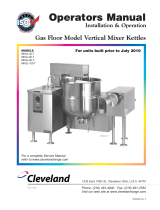5
OPERATING THE KETTLE
DO NOT LEAN ON OR PLACE OBJECTS ON
KETTLE LIP. SERIOUS INJURY COULD RESULT
IF KETTLE TIPPED OVER, SPILLING HOT
CONTENTS.
1. Before turning kettle on, read the
Vacuum/Pressure Gauge (4). The gauges
needle should be in the green zone. If the
needle is in the "VENT AIR" zone, refer to the
Kettle Venting Instructions (page 19). Any air
that may be present will increase cooking
times. Once heated, the kettle's normal
maximum operating pressure is approximately
10-12 psi, while cooking a water base product.
2. Ensure that the electrical service to the kettle
is turned on at the fused disconnect switch.
Temperature Range Chart
3. Preheat the kettle by turning the ON/OFF
Switch/Solid State Temperature Control (1) to
the desired temperature setting (see above
"Temperature Range Chart"). The Heat
Indicator Light (Green) (2) will remain lit,
indicating the burner is lit, until the
temperature setting is reached. When the
green light goes off, the heaters are off, and
preheating is complete.
NOTE: When cooking egg and milk products, the
kettle should not be preheated, as products of this
nature adhere to hot cooking surfaces. These
types of food should be placed in the kettle before
heating is begun.
4. Place food product into the kettle. The Heat
Indicator Light (Green) (2) will cycle on and
off indicating the elements are cycling on and
off to maintain the set temperature.
NOTE: Do not fill kettle above
recommended level marked on
outside of kettle.
NOTE: The Low Water Indicator Light (Red) (3)
should not be lit during kettle operation. This light
indicates that the elements have been
automatically shut off by the kettle's safety circuit.
It is normal for the red light to come on when the
kettle is in a tilted position. However, the kettle
cannot be operated when the red light remains lit
while the kettle is in the upright position. This
indicates a low water condition, and water must
be added to the reservoir. Refer to Reservoir Fill
Procedures on page 19 of this manual for details.
5. When cooking is completed place ON/OFF
Switch/Solid State Temperature Control (1) to
the "OFF' position.
6. Pour the contents of the kettle into an
appropriate container by tilting the kettle
forward. Care should be taken to pour slowly
enough to avoid splashing off the product.
NOTE: As with cleaning food soil from any
cookware, an important part of kettle cleaning is to
prevent food from drying on. For this reason, cleaning
should be completed immediately after cooked foods
are removed. Refer to the Cleaning Instructions (page
6) for detailed kettle washing procedures.
APPROXIMATE BOILING
TIMES
The accompanying chart shows approximate
times required for electric kettles of various
capacities to boil water. The ON/OFF Switch/Solid
State Temperature Control (1) must be set at "10"
(Max.) throughout the heatup period. Water will
boil about 1/3 faster if the kettle is filled only to the
outer steam jacket's welded seam, resulting in a
kettle filled to 2/3 capacity.
Temperature Approximate
Control Product Temperature
Setting °F °C
1. (Min.) 130 54
2. 145 63
3. 160 71
4. 170 77
5. 185 85
6. 195 91
7. 210 99
8. 230 110
9. 245 118
10. (Max.) 260 127
NOTE: Certain combinations of ingredients will
result in temperature variations
Times in Minutes
Gals. Ltrs. Standard Wattage High Wattage*
208V 240V 480V 208V 240V 480V
25 95 60 45 60 40 30 30
40 150 60 50 75 40 30 30
60 225 100 75 75 50 40 40
80 300 130 100 100 65 50 50
100 375 160 120 120 80 60 60
*High Wattage is only available with 3 phase units.

























